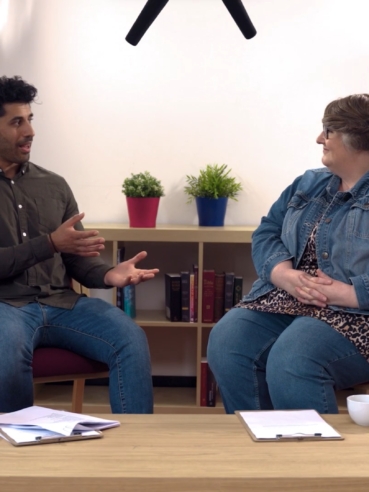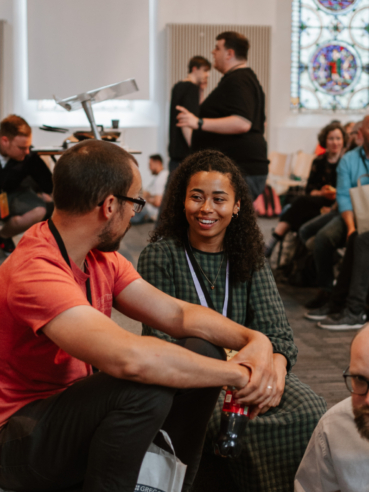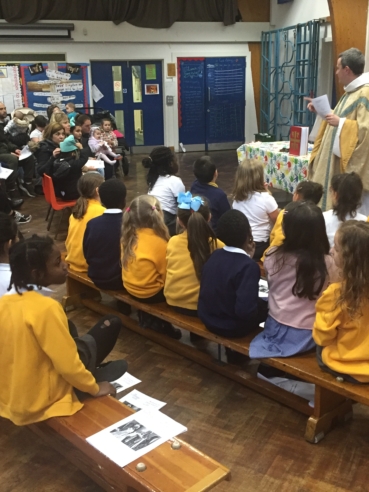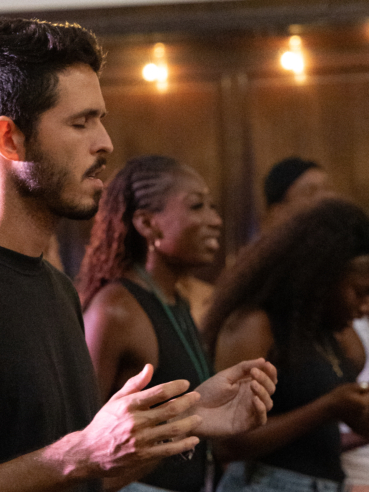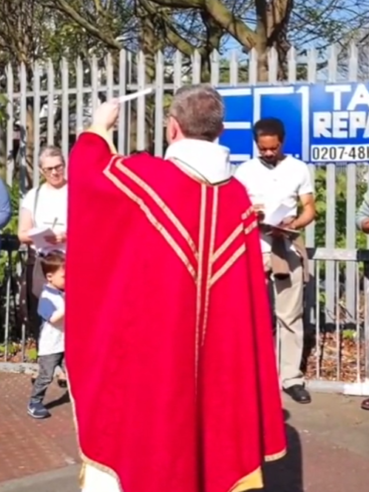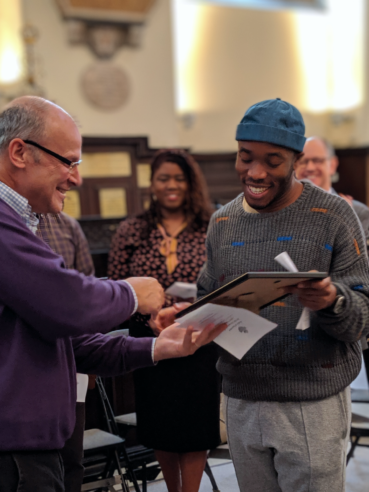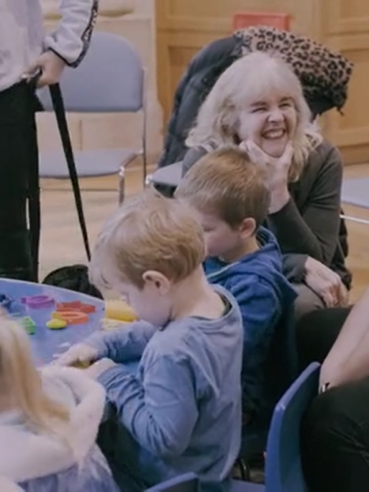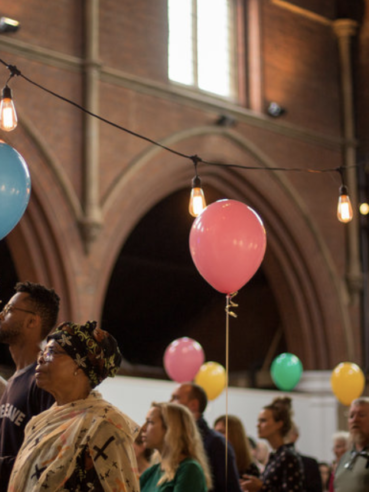The path approaching St Etheldreda’s Church, Fulham, features a line of planters, full of spring beauty, colour and life, echoing those along the side of the church facing the bus stop on the busy Fulham Palace Road. The flowering containers are organised, ordered, formal, with foliage and flower colours grouped together – they are planned by someone who knows what they are doing.
It’s a fitting metaphor for what God has been doing and what is happening now at St Eth’s as it is now known. Five years ago this church in the Anglo-Catholic tradition had a handful of attendees; now there is new life, with more than 100 now gathering on Sundays with a base of 200. Out of this reinvigorated congregation two new worshipping communities have now been planted, each of them expressing the vitality of sacramental worship in different but authentic ways, both flourishing under the oversight of the vicar and leadership of the two curates.
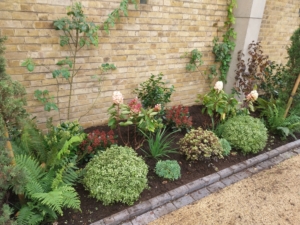 Of the gardens, Vicar Fr Ross Gunderson explains: ‘We’ve been blessed by having the right people around. We have someone in the congregation who is a gifted gardener and who offered to do the gardens for us. She was used to planning formal gardens in France. She also understood our vision of how we want to be perceived, with beauty, engagement and order at the heart of what we do and who we are..
Of the gardens, Vicar Fr Ross Gunderson explains: ‘We’ve been blessed by having the right people around. We have someone in the congregation who is a gifted gardener and who offered to do the gardens for us. She was used to planning formal gardens in France. She also understood our vision of how we want to be perceived, with beauty, engagement and order at the heart of what we do and who we are..
Fr Ross arrived at St Eth’s in 2018 to, in his own words, ‘a fertile and healthy, but small congregation.’ The church had been in decline for 20 years, he says, ‘they were happy to be small, however there was a desire to grow but not to change.’
Arriving from a parish in the sacramental tradition in Southwark Diocese, Fr Ross found the demographic of Fulham to be similar in many if not all ways.
‘In both churches, expectations were and are high. I already knew what it was like to work in that environment. Another similarity was the fact that the problems people face here are often not obvious but can be hidden behind their nice front doors.’
His appointment as vicar came with a brief to see growth at St Eth’s. Included in the plan was to invite the small congregation of nearby All Saints Fulham church to join with him and plant into St Eth’s. While growth was on Fr Ross’ heart for the church and its community, he admits it ‘felt strange to go to All Saints, arriving to get to know people and then to ask them to leave and come with me to another church down the road. It was hard and painful at the start to “buy in”’ to the future.
‘One of the first things I did was to take my church wardens and lay chair of the PCC on the CCX Plant Course. It was a way of helping us all understand our differences and look at how we could grow in our context. It also showed us how to set targets for ourselves as a church community. We worked out how much we wanted to grow by – not so we could say it was our achievement but so we could rejoice when we achieved goals.’
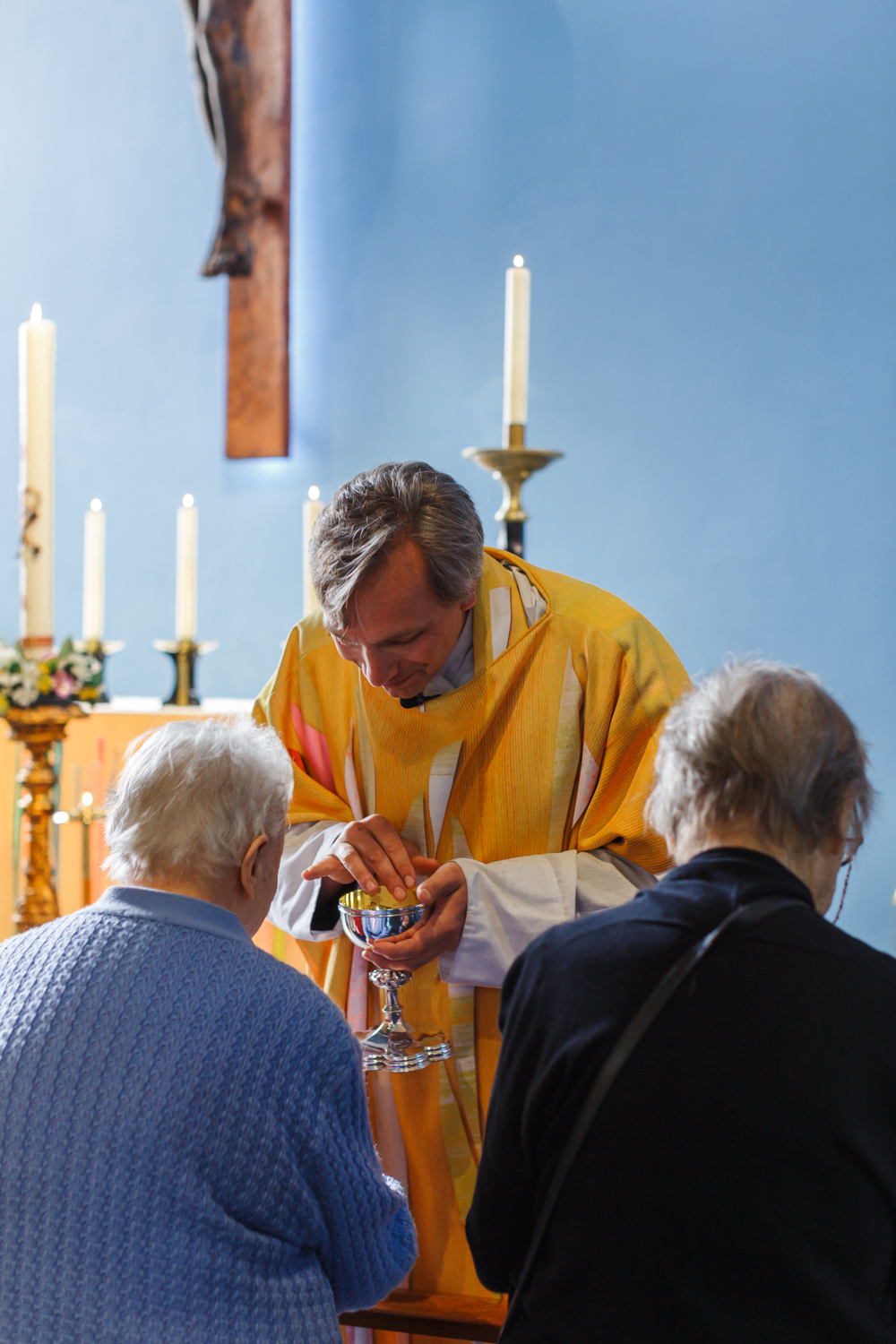 The first target set was to have a pool of 100 regular worshippers by the end of year one – an ambitious growth target they amazingly achieved. To encourage members to hold to the vision, Fr Ross felt it was important for people who were part of a small congregation at the time to experience what it felt like to have a full church, so hosting what he calls a ‘blockbuster carol service’ helped people with the vision.
The first target set was to have a pool of 100 regular worshippers by the end of year one – an ambitious growth target they amazingly achieved. To encourage members to hold to the vision, Fr Ross felt it was important for people who were part of a small congregation at the time to experience what it felt like to have a full church, so hosting what he calls a ‘blockbuster carol service’ helped people with the vision.
After the first year, the same target was set again – another journey for another 100 core worshippers – and people came. When asked how the growth happened, Fr Ross is honest:
‘In some cases a church can gather a team and plant. Our team was just me, and for the first few years every single thing that happened, it was down to me to get it done. Our finances meant that we couldn’t afford to have anyone else which put a huge pressure on any outreach so it really was a matter of graft and resilience. I needed to have structures and boundaries – but I recognise that being a priest is a vocation not a job and so however hard it was, I was glad to do it.’
Then Covid arrived, the pandemic conditions resulting in the church having to shut its doors.
‘Covid forced us to close,’ recalls Fr Ross. ‘We didn’t want to but we had to, and so we set up a charity to feed people. The result was that even though some parishes were shrinking, we began to grow.
‘We fed 5,000 people a week with the help of volunteers; people who never came to church started to see St Eth’s as their home and wanted to help. We bought stuff people needed and delivered it and we set up a hotline for people to call. We had daily reflections on social media. We wanted to be there to serve people. And volunteers just came along – most of them not even from the church.
‘The wonderful thing was that serving in this way at this time changed the reputation of the church. It didn’t just happen, it happened intentionally – we reached out and served because it’s the work of Christ and we know that the work of Christ will always have a positive impact.’
When the covid pandemic passed, Bishop Graham named St Eth’s as one of the Kensington area’s fastest growing churches, Fr Ross was asked to take on a curate, Briony Mackie, who arrived in 2022.
‘When I first met Briony ,’ he says, ‘I could see that she had a missional heart and gifts. She had a background of many years in a charismatic setting but more recently attended and was sent for ordination from an Anglo-Catholic church. Briony had seen the fruits of planting; she knew about and understood plants and felt called to continue her journey in a sacramental church.’
At about the same time as Briony’s arrival, Eva Webb Sheen, who had grown up locally, was reaching the end of the discernment process and beginning ordination training in the Church of England.
‘The face of St Eth’s was changing,’ says Fr Ross. ‘Where there had only ever been a man behind the altar, we had two women clergy in the same sacramental setting. There was no opposition at all – at the deeper levels, it didn’t change things in any way – the church and its tradition continued the same.’
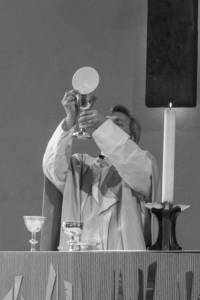 ‘In the Anglo-Catholic tradition, the Sacraments are central to our worship and our lives,’ explains Fr Ross. ‘They give us the tools to do mission. We’re fed by coming to the altar and are sustained to meet and be the face of Christ during the week. It’s our primary focus. It’s about Christ – we look to him for our sustenance. Our focus isn’t on human relationships primarily and we’re not personality-led. Our focus is on forming a lasting relationship with God and his church’
‘In the Anglo-Catholic tradition, the Sacraments are central to our worship and our lives,’ explains Fr Ross. ‘They give us the tools to do mission. We’re fed by coming to the altar and are sustained to meet and be the face of Christ during the week. It’s our primary focus. It’s about Christ – we look to him for our sustenance. Our focus isn’t on human relationships primarily and we’re not personality-led. Our focus is on forming a lasting relationship with God and his church’
With two curates, and increased capacity, the church continued to look outwards, considering how it could continue to reach local people in new places and in new ways. One of the results has been two new plants which have started respectively at a state secondary school and at St Clement’s, the second church of the St Eth’s parish based a little way down the road.
The school plant is based at Fulham Cross Academy, led by Briony, who became a school governor a year ago. Briony is grateful to have established a good relationship with the executive head teacher who was receptive to her suggestion of going into school once a week, initially as a volunteer chaplain. The role has since developed into a paid position, with the school paying the parish for Briony’s time to spend one day a week creating a spiritual space for students and staff alike – a space as she explains, that has never been there before.
‘It is not a faith school so everything I do is for all faiths and those with no faith – I’m there for everyone but of course I am openly a Christian, I wear my collar so everyone knows who I am and what I believe. I get to stand on the gate on my school days – it’s such a privilege to greet each student and to be a presence as they arrive.
‘I take three assemblies a term – on Ash Wednesday I took an assembly service and offered imposition of ashes afterwards. I had a long queue of students wanting to receive them. I’m basically using Christian words and using what the Church has and offering it to everyone.’
The heartbeat of the chaplaincy is the God Club which meets on Wednesday lunchtimes, with between 20 – 25 students coming along.
Journeying with this growing community, Briony has offered a day trip to Westminster Abbey and a youth pilgrimage to the shrine at Walsingham, where she recently took 12 students along with a teacher.
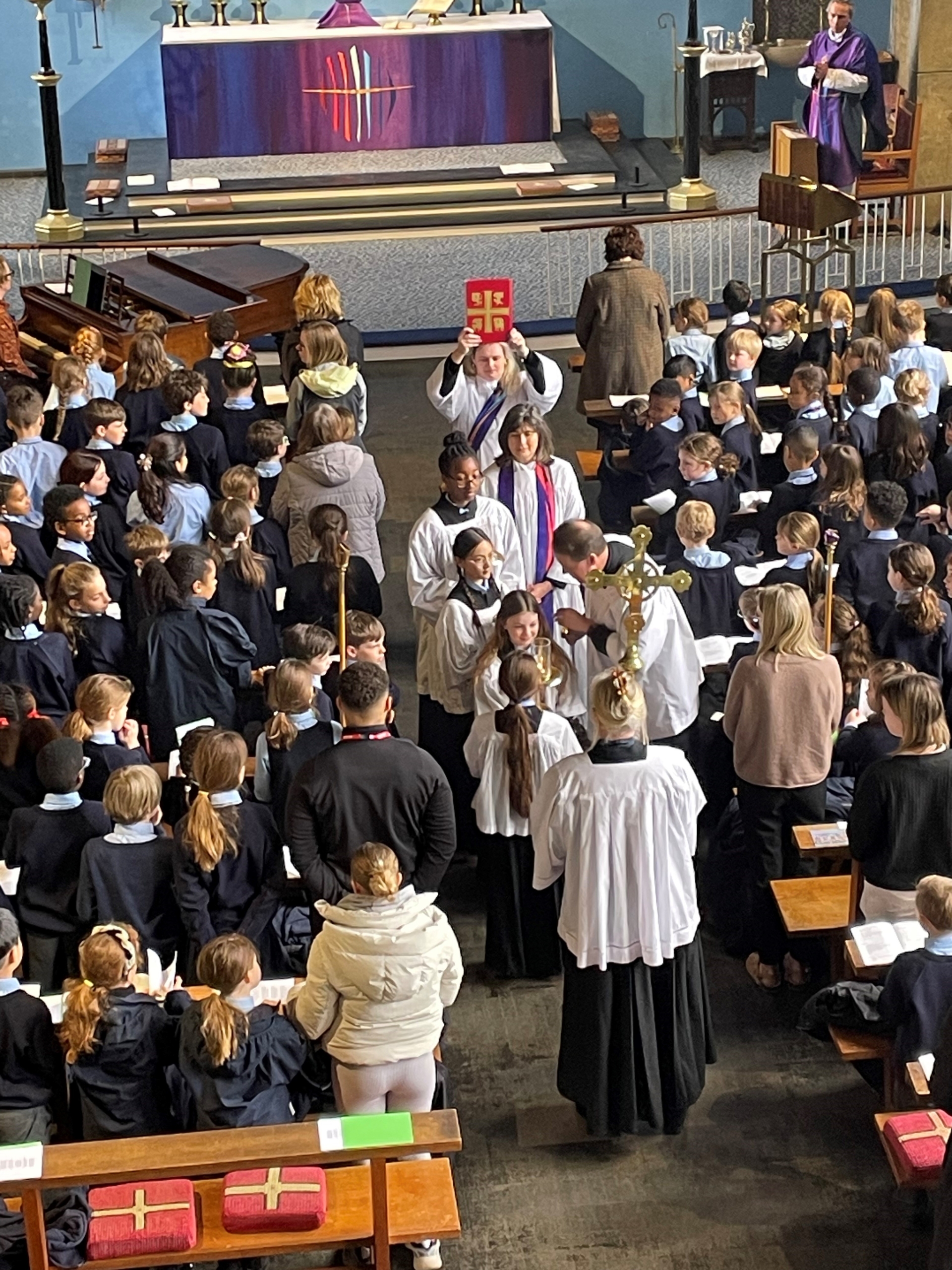
‘Some of those who came were Christians but the majority weren’t, so we explained things all the way and they loved it.’ Briony is passionate as she speaks about how the sacraments and all that the Anglo-Catholic tradition offers as tools to be used in sharing the Christian faith. ‘We have everything,’ she says, ‘liturgy, vestments and the altar itself – all there for the taking and to be used to explain our faith!’
Alongside the God Club and worship in the form of assemblies, Briony is able to offer wider support: assisting the RE department; mentoring; helping with staff well-being; and through the partnership, the church offers free business camps. This comes with opportunities for individuals in the school community to explore baptism and confirmation and blessings.
Fr Ross recognises that Briony’s work and her heart for the school has built up trust between the school and church.
‘We have found that there is great favour between the Briony and the school, even among students of other faiths,’ says Fr Ross. ‘There is a high level of respect and we are watching to see what God will continue to do there.’
At St Clement’s church, a second church plant is being led by curate Eva, who speaks of herself as a ‘home-raised curate’. Previously an HR Director, she would not have called herself a Christian until the age of 32 and only came to church when her sister attended to have her baby baptised at St Eth’s.
Eva joined the PCC in 2021 and, having completed the discernment process, was ordained deacon last year. She continues studying for a BA at St Mellitus College and will be priested this summer.
Eva shares a contagious enthusiasm when she speaks about her vocation and life at St Eth’s. ‘I love the catholic element it is where I feel at home with God and the sacraments are what feed me spiritually, I feel privileged and blessed to work with my colleagues in the Parish, the mix we have here of tradition and theology makes for really exciting ideas on how we approach outreach. I think it’s important to recognise the graft needed, though, the office phone calls, coffee time with people and the effort we put in. It’s putting in the work daily – not just for the big events, like the camels and donkeys at Christmas!’ (To find out more here.)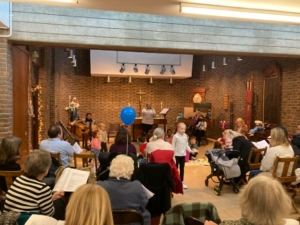
‘It’s all about a journey with people, we’re investing in them and seeing what comes from that. This is the real Church of England, we’re in it for the long game. We offer what we have and God is amazing, so he can do anything.
‘We’re building systems and structures, but we may not see any fruit for three to five years. In fact we may never see the fruit here, as we’ll move on. I think as clergy, we need to keep ourselves in check when it comes to Kingdom work, because it’s not about the person, it’s not about us, it’s about God.’
Eva has planted into St Clement’s – the two parishes were merged, with the original St Clements church building knocked down and replaced with a smaller one, positioned in the half of the parish with a more marginalised demographic to that of St Eth’s. The church sits next door to an estate, opposite the local community park and has the community non-faith primary school at the end of the road.
Like St Eth’s, the church had been managing decline with only a small worshipping community remaining.
‘Many of the families had moved out as the area became gentrified,’ explains Eva, ‘but we were still wanting to find something which would attract people living nearby. The Puppet Church idea came from the inspiration of Bubble Church (link to CCX story about Bubble Church) and we’ve found it is a format that really breaks down any barriers.’
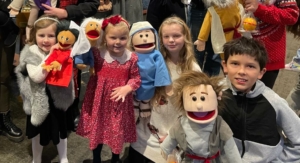 Puppet church is a 30-minute liturgical and eucharistic service, aimed at all ages and maintaining all the authenticity of sacramental worship. Eva’s creative team includes a liturgist and the musical director from St Eth’s as well as volunteers from the existing St Clem’s church and St Eth’s
Puppet church is a 30-minute liturgical and eucharistic service, aimed at all ages and maintaining all the authenticity of sacramental worship. Eva’s creative team includes a liturgist and the musical director from St Eth’s as well as volunteers from the existing St Clem’s church and St Eth’s
‘It’s especially accessible for unchurched people,’ says Eva. ‘Those who might not usually come or who have no experience of going to go to church; people come and immediately enter into the zone. Children can touch the puppets and even touch the unconsecrated host, they are really part of what’s going on and we explain things in an accessible manner, with songs, actions and of course puppets, whilst still being sacramental It is really clear to see that puppet church follows the liturgy of a traditional Eucharist service it is well received from adults and children.
‘Our aim was to attract families and it’s been great that the service has proved especially popular with families and children with additional needs. Sadly, sometimes we hear families talk about negative experiences of church, but they say they feel welcome here.
‘We’ve invested in sensory seats, and other sensory resources. The space is really open and all on one level. We really feel God at work and its creating something really special – we’re led in singing but everyone joins in.’
Fr Ross is clear of their responsibility and calling to be ‘sentinels’ – taking account of the scene and watching out for opportunities in respect of planting.
‘Having now planted twice, we’re on the lookout to see what’s next,’ he says.
Fr Ross is on the creative growth board for the Diocese overseen by Bishop Ric Thorpe. On the wider scope of growth across the Church, he explains, ‘We want to invest in what we have and what’s before us. We want to help the whole Church of England to see that as catholics, we have tools we can use in mission and do everything we can to reach out with them. It’s a new mindset but using what we already have. We are using baptisms, funerals, confirmations and the parish system in general – all of these offer opportunities, each of these set us up for growth.’
‘We say yes to every invite,’ explains Eva. ‘”Yes, of course we’ll do your funeral/baptise your child; Yes, please come along to confirmation classes”.’
Having identified an opportunity to host a gathering that explains more about the church’s core belief and worship, Eva has put together a Catholic form of Catechism.
‘People with no church background sometimes say: “I don’t know why I feel good when I go to church?” – the course is trying to journey together and demystify it, explain it – offer a taster.’ The six-week course takes candidates through the main pillars of the liturgy, explaining the place of scripture, peace and prayer, forgiveness and the eucharist, ending with the dismissal and sending out.
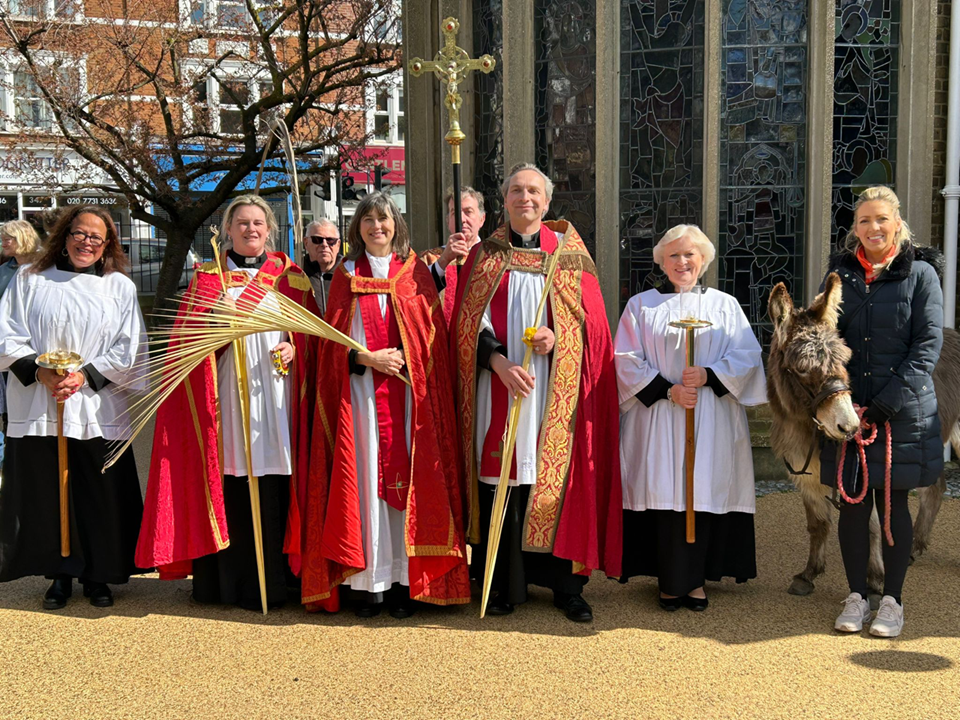
An additional focus for Briony has been constructing discipleship material, her church background allowing her to present a hybrid offering of both catholic and charismatic. ‘We meet as a group for six weeks and follow a course I devised, looking at the sacraments of the church, the Bible, and the trinity. Our aim is that each confirmand is in an area of service and a home group post-confirmation’.
All the team agree that having the richness of the liturgy at their fingertips brings a freedom to what they do. They say that the sacraments provide all they need but trusting in them and in God to work through them frees them up to be out and about in the parish and prevents burnout. It’s about God working through what has been set in motion by Jesus Christ himself. The sacraments bring a liberation to ministry as we live out Jesus’ call for us to do this in remembrance of him. It’s not and cannot be about us as Priests of His church. It’s about Christ himself giving Himself fully to us in a real and physical form. That’s what feeds His people.
‘What we have is gold,’ says Briony. ‘Whether people are young or old, we can see people relating to the beauty of the liturgy and the sacraments. And finding God in all of it. God’s grace isn’t contained in the walls of a church, it’s outside and beyond – it’s the same wherever we are and he has given us everything we need to tell others, for mission and for growth.’
CCX offers a range of courses and resources including the Plant course and the Grow course. To ask us a question about these courses and more, email us on hello@ccx.org.uk

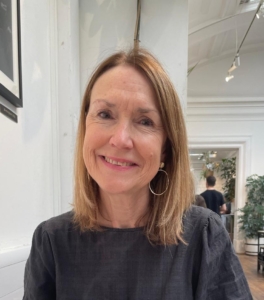
 Of the gardens, Vicar Fr Ross Gunderson explains: ‘We’ve been blessed by having the right people around. We have someone in the congregation who is a gifted gardener and who offered to do the gardens for us. She was used to planning formal gardens in France. She also understood our vision of how we want to be perceived, with beauty, engagement and order at the heart of what we do and who we are..
Of the gardens, Vicar Fr Ross Gunderson explains: ‘We’ve been blessed by having the right people around. We have someone in the congregation who is a gifted gardener and who offered to do the gardens for us. She was used to planning formal gardens in France. She also understood our vision of how we want to be perceived, with beauty, engagement and order at the heart of what we do and who we are.. The first target set was to have a pool of 100 regular worshippers by the end of year one – an ambitious growth target they amazingly achieved. To encourage members to hold to the vision, Fr Ross felt it was important for people who were part of a small congregation at the time to experience what it felt like to have a full church, so hosting what he calls a ‘blockbuster carol service’ helped people with the vision.
The first target set was to have a pool of 100 regular worshippers by the end of year one – an ambitious growth target they amazingly achieved. To encourage members to hold to the vision, Fr Ross felt it was important for people who were part of a small congregation at the time to experience what it felt like to have a full church, so hosting what he calls a ‘blockbuster carol service’ helped people with the vision. ‘In the Anglo-Catholic tradition, the Sacraments are central to our worship and our lives,’ explains Fr Ross. ‘They give us the tools to do mission. We’re fed by coming to the altar and are sustained to meet and be the face of Christ during the week. It’s our primary focus. It’s about Christ – we look to him for our sustenance. Our focus isn’t on human relationships primarily and we’re not personality-led. Our focus is on forming a lasting relationship with God and his church’
‘In the Anglo-Catholic tradition, the Sacraments are central to our worship and our lives,’ explains Fr Ross. ‘They give us the tools to do mission. We’re fed by coming to the altar and are sustained to meet and be the face of Christ during the week. It’s our primary focus. It’s about Christ – we look to him for our sustenance. Our focus isn’t on human relationships primarily and we’re not personality-led. Our focus is on forming a lasting relationship with God and his church’

 Puppet church is a 30-minute liturgical and eucharistic service, aimed at all ages and maintaining all the authenticity of sacramental worship. Eva’s creative team includes a liturgist and the musical director from St Eth’s as well as volunteers from the existing St Clem’s church and St Eth’s
Puppet church is a 30-minute liturgical and eucharistic service, aimed at all ages and maintaining all the authenticity of sacramental worship. Eva’s creative team includes a liturgist and the musical director from St Eth’s as well as volunteers from the existing St Clem’s church and St Eth’s

